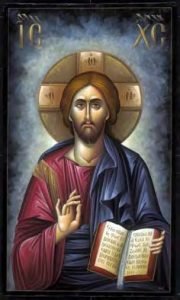 The next thing that must be considered is Jesus AS the WORD. The Logos-doctrine of the fourth Gospel, which is John’s Gospel, represents the summit of New Testament Christology. Here the power of the divine Word is revealed in all its fullness: He is Creator and Redeemer, the Judge in the time to come and the sacrificial Lamb, the High Priest and the servant of servants. Paradoxically – or rather, in the language of the Church Fathers, “antinomically” (i.e., the structural makeup of Jesus)
The next thing that must be considered is Jesus AS the WORD. The Logos-doctrine of the fourth Gospel, which is John’s Gospel, represents the summit of New Testament Christology. Here the power of the divine Word is revealed in all its fullness: He is Creator and Redeemer, the Judge in the time to come and the sacrificial Lamb, the High Priest and the servant of servants. Paradoxically – or rather, in the language of the Church Fathers, “antinomically” (i.e., the structural makeup of Jesus)
His power is revealed through self-abasement, suffering and death, just as those who assume His ministry of reconciliation will be called to manifest their strength through weakness. It is this antinomy that reveals the true nature of the Word: the Word of God is a Person, a divine hypostasis of the Holy Trinity, who becomes incarnate in the person of Jesus of Nazareth. The Word becomes flesh; therein alone lies His power to assume human life and to raise it to an eternal, glorified order of existence.
In authentic Christian experience, the Word comes to its fullest expression within a sacramental context. Whether proclaimed through Scripture reading and preaching, or sung in the form of antiphons and dogmatic hymns, the Word of God is primarily communicated – expressed and received – by the ecclesial act of celebration, and, in particular, celebration of the Eucharistic mystery. So what I am saying is that the Word of God truly becomes present to us in the act of celebrating the Eucharist. Why? Because it makes Him present to us in a real way and it also repeats the pri-mary act of His entire life, namely offering His own life back to the Father in real Thanksgiving for the gift of human life. As we repeat what He did, we too join with Him in offering real Thanksgiving to the Father for the gift of life. This is the focus of our celebration of the Divine Liturgy – to join with Jesus in offering to God our lives in thanksgiving for the gift of life.
The Sacred Scriptures for a great part of our celebration. All the texts of the Divine Liturgy are Scripture based. The Word of God, the Second Person of the Trinity, is truly made present to us in our Eucharistic celebration.
As the resurrection appearance at Emmaus indicates, the first generation of Christians situated proclamation of the Word in an ecclesial-liturgical setting. The risen Lord draws near to two of His disciples and inquires as to the subject of their conversation. That happens in the Divine Liturgy.
